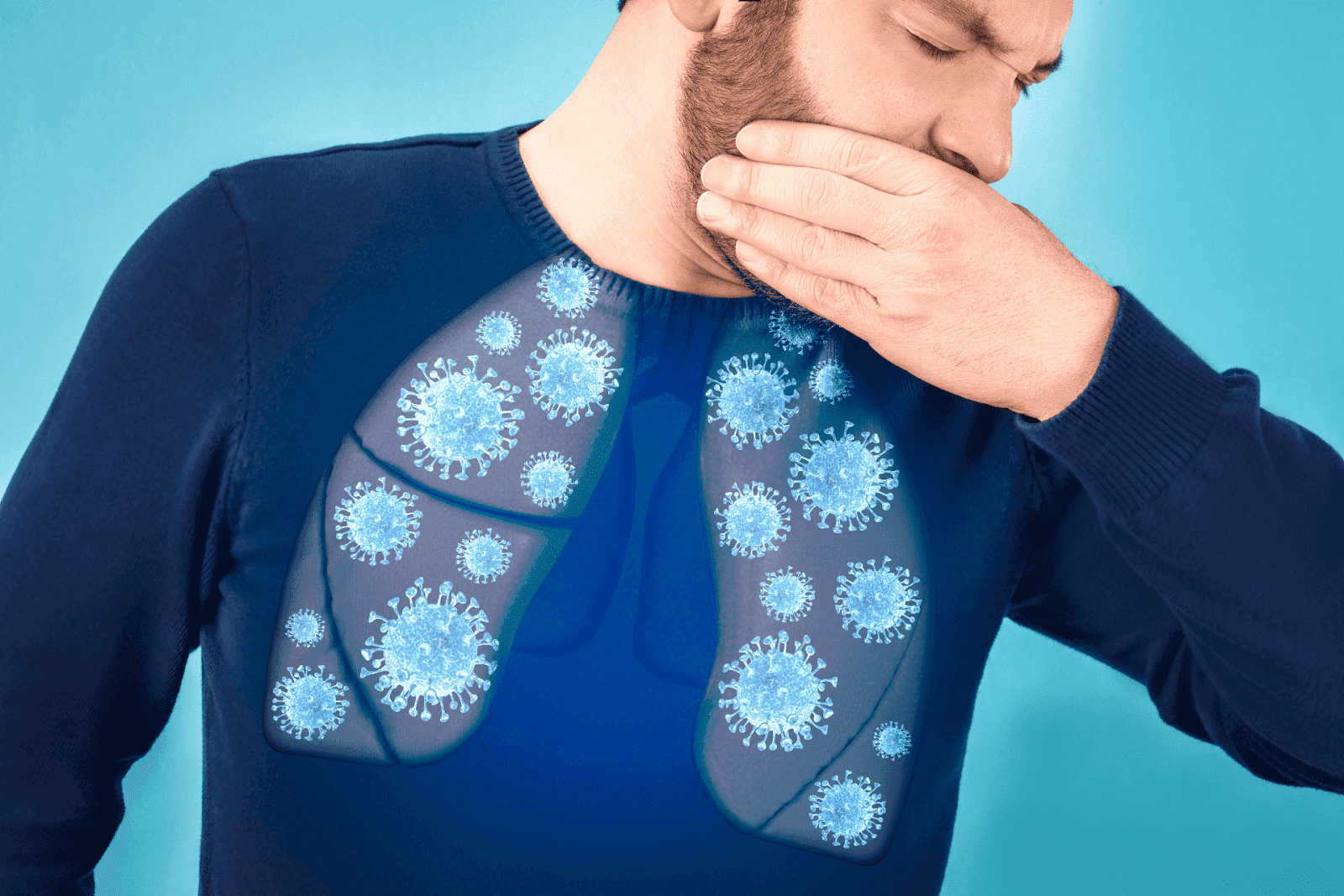What Does a Pneumonia Cough Sound Like?
Pneumonia is a common but potentially serious lung infection that affects millions of people worldwide every year. One of the hallmark symptoms of pneumonia is a distinctive [...]
Read More
Medically reviewed by Alan Lucks | MD, Alan Lucks MDPC Private Practice - New York on October 13th, 2025.
Wet, rattling sounds with thick green, yellow, or blood-streaked sputum indicate bacterial infection, while viral cases often start with dry coughs that progress to productive within 2-3 days.
The distinctive "crackling" or "rales" heard during breathing occurs when air bubbles through fluid-filled alveoli, creating sounds audible even without a stethoscope in severe cases.
Bacterial infections typically produce deeper, harsher barking sounds with more voluminous sputum, while viral types create higher-pitched wheeze-like rattling with thinner secretions.
Seek immediate medical care when wet coughs combine with fever above 101°F (38.3°C), sharp chest pain that worsens with breathing, or blood-tinged mucus appearing suddenly.
The "productive" nature distinguishes this from dry bronchitis coughs—healthy lungs should never produce the continuous wet rattling sound characteristic of fluid accumulation.
Pneumonia is a common but potentially serious lung infection that affects millions of people worldwide every year. One of the hallmark symptoms of pneumonia is a distinctive cough, which can sometimes help differentiate it from other respiratory illnesses like the common cold or bronchitis. Understanding what a pneumonia cough sounds like can be crucial for early detection and timely treatment, especially in situations where immediate medical consultation is not possible.
In this article, we will explore the characteristics of a pneumonia cough, how it differs from other types of coughs, and what additional symptoms to watch for. We will also discuss the importance of seeking professional medical advice and how modern telehealth services like Doctronic.ai can provide quick, reliable AI-powered consultations to guide you through your symptoms.
 Understanding Pneumonia and Its Symptoms
Understanding Pneumonia and Its SymptomsPneumonia is an infection that inflames the air sacs in one or both lungs. These air sacs may fill with fluid or pus, causing symptoms such as cough, fever, chills, and difficulty breathing. The infection can be caused by bacteria, viruses, or fungi, and its severity ranges from mild to life-threatening, particularly for infants, elderly adults, and people with weakened immune systems. The onset of pneumonia can be sudden, often following a cold or flu, which can make it difficult for individuals to recognize the seriousness of their symptoms initially.
Recognizing pneumonia early is vital because prompt treatment can prevent complications. The cough associated with pneumonia is often one of the first signs that something more serious than a typical cold is occurring. In addition to the cough, individuals may experience a rapid heartbeat and a feeling of fatigue that can be overwhelming. This fatigue can be particularly debilitating, as the body is working hard to fight off the infection, leading to an overall sense of malaise that can last for days or even weeks.
Not all coughs are created equal. A cough from pneumonia tends to have specific characteristics that set it apart from other respiratory conditions:
Productive Cough: Pneumonia often causes a productive cough, meaning it produces mucus or phlegm. This sputum may be green, yellow, or even tinged with blood, indicating the presence of infection and inflammation in the lungs.
Deep and Persistent: Unlike a dry cough that comes and goes, a pneumonia cough is usually deep, persistent, and can be quite painful due to inflammation in the lungs. The discomfort can be exacerbated by deep breathing or laughing, making everyday activities challenging.
Accompanied by Wheezing or Crackling Sounds: When you cough with pneumonia, you might hear wheezing or crackling sounds, which are caused by the air moving through fluid-filled airways. This can be alarming and often prompts individuals to seek medical attention sooner.
These features can help distinguish pneumonia from other illnesses such as bronchitis, which often causes a dry or less severe cough, or asthma, which typically produces wheezing without significant sputum. Understanding these differences is crucial for timely diagnosis and treatment. In addition to cough characteristics, pneumonia may also present with other symptoms such as chest pain that worsens with breathing or coughing, and a high fever that may not respond to over-the-counter medications. Recognizing these signs can be essential for individuals and caregivers alike, as they navigate the complexities of respiratory health.
Describing the sound of a pneumonia cough can be challenging, but there are some common auditory clues:
A pneumonia cough is often described as wet or rattling because of the mucus in the lungs. It sounds like a constant clearing of the throat or a rattling noise deep in the chest. This is due to the fluid buildup in the alveoli, the tiny air sacs in the lungs.
Because pneumonia causes inflammation and irritation in the lung tissue, coughing can be harsh and sometimes painful. Patients often report that coughing triggers chest pain or discomfort, which can be sharp or dull.
The cough does not subside quickly. It tends to be persistent, lasting for days or even weeks if untreated. This ongoing cough can be exhausting and may interfere with sleep and daily activities.
In addition to the cough itself, pneumonia may cause wheezing or crackling sounds during breathing. These sounds can sometimes be heard without a stethoscope, especially in severe cases.
A cough alone is not enough to diagnose pneumonia, but when combined with other symptoms, it can be a strong indicator. Watch for the following signs:
Fever and Chills: High fever is common, often accompanied by chills and sweating.
Shortness of Breath: Difficulty breathing or rapid breathing may occur as the lungs struggle to oxygenate the blood.
Chest Pain: Sharp or stabbing chest pain that worsens with coughing or deep breathing.
Fatigue and Weakness: Feeling unusually tired or weak is common with pneumonia.
Confusion or Changes in Mental Awareness: Particularly in older adults, pneumonia can cause confusion or disorientation.
If you or someone you know experiences a cough with these symptoms, it is important to seek medical attention promptly.
Because pneumonia can progress rapidly and lead to serious complications, timely diagnosis and treatment are essential. If you notice a cough that sounds wet, harsh, or persistent, especially when accompanied by fever, chest pain, or difficulty breathing, do not delay in consulting a healthcare professional.
Traditional visits to urgent care or emergency rooms can be time-consuming and stressful. Fortunately, advances in telehealth have made it easier than ever to get expert advice quickly and conveniently. Doctronic.ai offers AI-powered doctor visits that are available 24/7 across all 50 states. You can get a comprehensive evaluation of your symptoms, including your cough, and receive guidance on the next steps for treatment or testing.
Telehealth platforms like Doctronic.ai provide several advantages for people experiencing symptoms of pneumonia:
Speed: Get answers in seconds without waiting in a crowded clinic or urgent care center.
Convenience: Consult from the comfort of your home, reducing exposure to other illnesses.
Expertise: Access AI-driven medical knowledge that synthesizes the latest peer-reviewed research for accurate assessments.
Affordability: Doctronic offers telehealth visits for under $40, making quality care accessible to more people.
While professional evaluation is critical, there are several steps you can take at home to alleviate the discomfort caused by a pneumonia cough:
Stay Hydrated: Drinking plenty of fluids helps thin mucus, making it easier to cough up.
Rest: Your body needs energy to fight the infection, so get plenty of rest.
Use a Humidifier: Moist air can soothe irritated airways and reduce coughing.
Follow Medical Advice: If prescribed antibiotics or other medications, take them exactly as directed.
Avoid Smoking and Irritants: Smoke and pollutants can worsen coughing and lung inflammation.
Remember, these measures support recovery but do not replace professional medical treatment, especially if symptoms worsen or fail to improve.
 Recognizing and Responding to a Pneumonia Cough
Recognizing and Responding to a Pneumonia CoughKnowing what a pneumonia cough sounds like and recognizing its associated symptoms can be lifesaving. A wet, persistent, and sometimes painful cough accompanied by fever, chest pain, and difficulty breathing warrants immediate medical attention.
Thanks to innovations in healthcare technology, getting expert advice has never been easier. Doctronic.ai combines the power of AI with modern medicine to provide fast, affordable, and personalized care. Whether you need a quick diagnosis, treatment recommendations, or a second opinion, Doctronic is revolutionizing how patients access primary care.
If you or a loved one are experiencing symptoms suggestive of pneumonia, don’t hesitate to seek help. Early detection and treatment can make all the difference in recovery and overall health.
If you're concerned about a cough that sounds like it could be from pneumonia, don't wait. Doctronic offers immediate, AI-powered insights into your symptoms, providing you with the most modern medical advice at the click of a button. Experience the personalized, 24/7 care that over 10 million people trust, with the convenience of telehealth video visits for less than $40. For a free AI doctor visit that's fast, informed, and tailored just for you, talk to an AI Doctor now.
The hallmark wet, rattling sound with colored sputum production clearly signals lung infection requiring prompt antibiotic or antiviral treatment. Don't wait if you're experiencing these distinctive sounds alongside fever or breathing difficulties. If you're unsure about concerning respiratory symptoms, Doctronic can provide personalized guidance to help determine when medical care is needed.
Pneumonia is a common but potentially serious lung infection that affects millions of people worldwide every year. One of the hallmark symptoms of pneumonia is a distinctive [...]
Read More